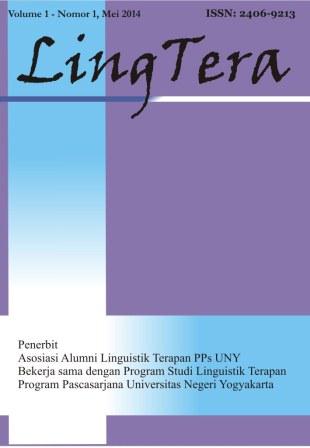Experiential meaning breadth variation of British Broadcasting Corporation (BBC) Indonesia online news
DOI:
https://doi.org/10.21831/lt.v5i1.7695Keywords:
experiential meaning breadth, variation, online news translationAbstract
The aims of this research were to describe experiential meaning variation of English BBC news texts (T1) and Bahasa Indonesia BBC news texts (T2) which were functional grammatically represented in transitivity clause units, to identify the factors that cause the experiential meaning breadth variation of T1-T2, and to map the context of highest variation of T1-T2. This qualitative research applied semantic content analysis of experiential meaning with the researcher as research instrument. The results of this study show that experiential meaning variation of T1-T2 is dominated by highest scale of variation. Transfer-based perspective includes T2 as bad translation, while hermeneutic-based includes T2 as a good translation. Experiential meaning breadth variation of T1-T2 are mainly caused by the ideology of translation of BBC and translators involved in translation process that allows adjustment to the new readership and to the naturalness of the use of Indonesian language to occur. The constrictions of experiential meaning breadth variation mostly are caused by the addition of clause-rank meaning units which are not part of T1 and the existence of summary and/or synthesis of some T1 clause-rank meaning units.
Downloads
Published
How to Cite
Issue
Section
Citation Check
License
LingTera allows readers to read, download, copy, distribute, print, search, or link to its articles' full texts and allows readers to use them for any other lawful purpose. The journal allows the author(s) to hold the copyright without restrictions. Finally, the journal allows the author(s) to retain publishing rights without restrictions.
- Authors are allowed to archive their submitted articles in an open-access repository.
- Authors are allowed to archive the final published article in an open-access repository with an acknowledgment of its initial publication in this journal.

Psychology, Evaluation, and Technology in Educational Research is licensed under a Creative Commons Attribution-ShareAlike 4.0 International License.
Based on a work at https://petier.org/index.php/PETIER.










